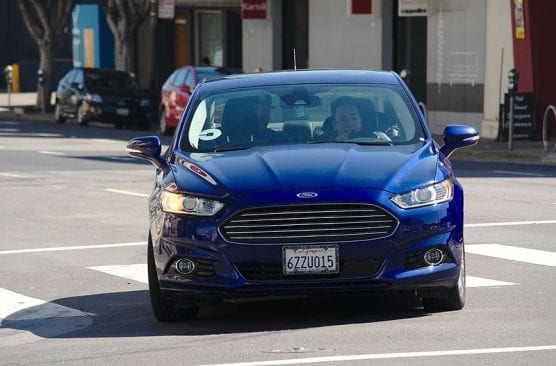SAN FRANCISCO — Arguing before a state appeals court Tuesday, Uber and Lyft lawyers predicted fewer rides for consumers, lower earnings for drivers and a spike in drunk-driving accidents if they are forced to classify California drivers as employees instead of contractors.
“I don’t want the court to think that if the injunction is affirmed, that these people will continue to have these earning opportunities because they won’t,” Lyft attorney Rohit Singla said.
The rideshare companies want California’s First Appellate District to overturn a lower court’s Aug. 10 preliminary injunction requiring them to start classifying drivers as employees. The injunction was stayed pending appeal on Aug. 20.
Joined by the cities of Los Angeles, San Francisco and San Diego, California Attorney General Xavier Becerra sued Uber and Lyft in May, accusing them of violating Assembly Bill 5 by misclassifying drivers as independent contractors and denying them employment benefits, such as minimum wage, overtime and unemployment insurance. AB 5 went into effect this past January.
If forced to comply with the law, Uber and Lyft say they could no longer let drivers choose their own working hours. Government lawyers say nothing in AB 5 prevents the tech giants from offering flexible schedules.
During a two-hour telephonic hearing before a three-judge panel, Singla said classifying drivers as employees would drastically change his client’s business model and make scheduling flexibility impossible.
He compared Lyft drivers to the state of California 235,000-person workforce of government employees.
“Do they have employees that can work whenever they want, stop working for a month or two,” Singla asked. “No employer can do that, have employees working as long as they want whenever they want.”
Both Uber and Lyft insist they are not “hiring entities” subject to the labor law but rather providers of technology platforms that connect drivers to riders.
Representing the government, San Francisco Deputy City Attorney Matthew Goldberg was asked how Uber and Lyft differ from other technology platforms such as eBay or Airbnb, which are not considered employers of users who sell products or home rentals on their platforms.
“There’s not a suggestion that the Airbnb folks are performing labor and that they should be subject to employment law,” Goldberg said.
When pressed about the labor involved in cleaning rental properties before and after stays, Goldberg noted that Airbnb provides a list of options from which consumers can choose, functioning more like an online bulletin board than an employer that arranges rides for passengers.
Representing Uber, attorney Theodore Boutrous acknowledged the California Legislature intended to target companies like Uber and Lyft when it passed AB 5 last year. But he said the Legislature missed the mark and that Uber has changed its business model since the law was passed.
He noted Uber drivers can now set their own fares, based on a price range provided by Uber, and reject rides without facing consequences. A monthly subscription-fee model also makes Uber less financially reliant on drivers giving individual rides, Boutrous argued.
First Appellate District Justice Tracie Brown noted that with a subscription-fee model, one driver not giving rides may not affect Uber’s finances, but if all drivers stopped giving rides, Uber would cease being a valuable service.
“To say that it’s not at all dependent on the drivers driving riders seems a bit of a stretch,” Brown said.
Boutrous also argued that driver reclassification could reduce the availability of app-based rides, which he said helps reduce drunk-driving accidents in California. Mothers Against Drunk Driving filed an amicus brief supporting Uber and Lyft’s position in the case.
Considering arguments that driver reclassification will cause major disruptions to Uber and Lyft’s business models and ride availability, Justice Jon Streeter suggested the injunction could potentially be narrowed so it only applies to full-time drivers.
“There’s also an enormous population of these drivers who are casual drivers,” Streeter said. “They don’t want to be employees.”
Goldberg replied that the injunction was already tailored to be as narrow as possible — merely requiring Uber and Lyft to comply with the law, not otherwise telling the companies how to run their businesses.
“There’s no distinction in the law that part-time workers aren’t entitled to business expense reimbursement or paid sick leave,” Goldberg said.
Attorneys for Uber and Lyft insisted the government failed to show drivers would suffer irreparable harm without an injunction. Goldberg responded by citing a 2014 labor law in which the California legislature declared the loss of wages a form of irreparable harm.
He cited sworn statements by multiple drivers saying they “don’t have sufficient money for food and healthcare” because Uber is denying them full wages and employment benefits.
“The loss of wages is in fact irreparable,” Goldberg said.
Presiding Justice Stuart Pollak joined Brown and Streeter on the panel.
Uber, Lyft and other gig companies have poured $187 million into a November 2020 ballot measure, Proposition 22, that would exempt them and other app-based services from complying with AB 5.
The ballot measure proposes keeping drivers as independent contractors but also entitling them to certain benefits, including guaranteed earnings of 120% of minimum wage, $0.30 reimbursement per mile for gas expenses, quarterly health care subsidies for drivers that work 15 hours per week or more, occupational accident insurance for on-the-job injuries, and anti-discrimination and sexual harassment prevention protections.
Critics say those benefits still fall short of what workers are entitled to under California law.
In August, the First Appellate District ordered the CEOs of Uber and Lyft to submit sworn statements confirming they have developed plans to comply with AB 5 within 30 days if the injunction is upheld and voters reject their proposed ballot measure.
— By Nicholas Iovino, CNS
Like this:
Like Loading...
Related





 Tweet This
Tweet This Facebook
Facebook Digg This
Digg This Bookmark
Bookmark Stumble
Stumble RSS
RSS




























REAL NAMES ONLY: All posters must use their real individual or business name. This applies equally to Twitter account holders who use a nickname.
0 Comments
You can be the first one to leave a comment.